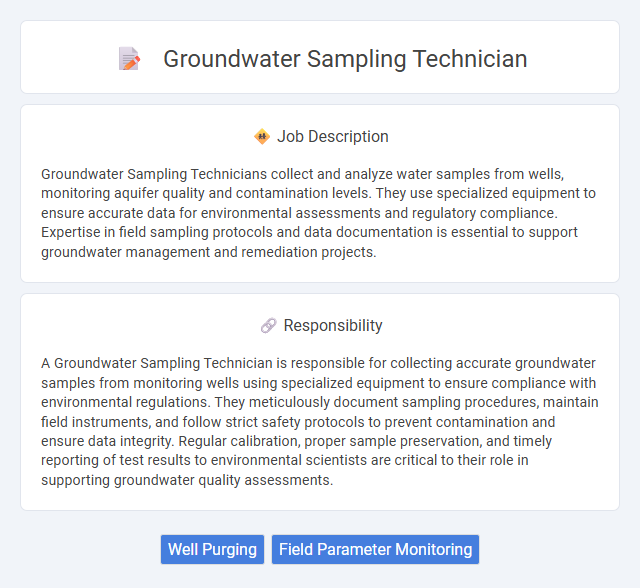
Groundwater Sampling Technicians collect and analyze water samples from wells, monitoring aquifer quality and contamination levels. They use specialized equipment to ensure accurate data for environmental assessments and regulatory compliance. Expertise in field sampling protocols and data documentation is essential to support groundwater management and remediation projects.
Individuals who enjoy working outdoors and have a strong attention to detail are likely to be well-suited for a Groundwater Sampling Technician role. Those comfortable with physical activity and handling technical equipment may find this job aligns with their skills and preferences. People preferring routine office work or limited physical engagement might find the demands of groundwater sampling less compatible with their work style.
Qualification
A Groundwater Sampling Technician requires a strong foundation in environmental science, typically possessing an associate degree or equivalent experience in geology, hydrology, or environmental engineering. Proficiency in operating specialized sampling equipment and adhering to safety protocols ensures accurate data collection and regulatory compliance. Certifications such as OSHA HAZWOPER and experience with EPA or state environmental standards enhance job performance and employability.
Responsibility
A Groundwater Sampling Technician is responsible for collecting accurate groundwater samples from monitoring wells using specialized equipment to ensure compliance with environmental regulations. They meticulously document sampling procedures, maintain field instruments, and follow strict safety protocols to prevent contamination and ensure data integrity. Regular calibration, proper sample preservation, and timely reporting of test results to environmental scientists are critical to their role in supporting groundwater quality assessments.
Benefit
Groundwater Sampling Technician roles likely offer benefits such as hands-on experience with environmental monitoring and data collection, enhancing skills in fieldwork and laboratory analysis. This position may provide opportunities for career growth within environmental science and regulatory compliance sectors. Employees might also receive health and safety training, improving workplace competency and personal protection awareness.
Challenge
The role of a Groundwater Sampling Technician likely involves navigating challenging field conditions, including inaccessible or remote locations, which may affect sample collection efficiency. Ensuring precise adherence to regulatory protocols during sampling is crucial, potentially demanding meticulous attention to detail under time constraints. This position may also require adapting to variable environmental factors that could impact data accuracy and overall project outcomes.
Career Advancement
Groundwater Sampling Technicians gain specialized expertise in environmental sampling methods, data analysis, and regulatory compliance, which opens pathways for career advancement into roles such as Environmental Scientist, Hydrogeologist, or Environmental Compliance Specialist. Mastery of industry-standard equipment and software enhances qualifications for supervisory positions or project management within environmental consulting firms. Continuing education and certifications, like OSHA HAZWOPER or professional geoscience credentials, significantly boost opportunities for promotion and higher salary brackets.
Key Terms
Well Purging
Groundwater sampling technicians specialize in well purging to remove stagnant water and ensure accurate contaminant analysis. Proper well purging involves using low-flow pumps or bailers to minimize turbidity and avoid cross-contamination during sample collection. Expertise in monitoring purge volume, flow rate, and water quality parameters is essential for regulatory compliance and reliable groundwater monitoring results.
Field Parameter Monitoring
Groundwater Sampling Technicians specialize in Field Parameter Monitoring by accurately measuring essential water quality indicators such as pH, temperature, dissolved oxygen, and turbidity onsite. These real-time data collections ensure precise assessment of groundwater conditions for environmental compliance and contamination analysis. Expertise in calibrating and maintaining multiparameter sondes and handheld sensors is crucial for reliable groundwater monitoring results.
 kuljobs.com
kuljobs.com